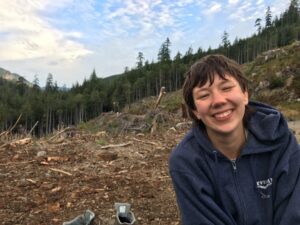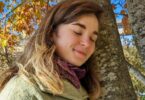She spent the afternoon the same way she had every day that week, digging around the lake after swimming lessons with the dog-eared blue book tucked under her arm. In her bag, a rosemary sprig, a stubby white candle.
All week, Fran had been considering the jaw of the squirrel, and now she walked through the campground to the park, watching for corners, for brush, or bare patches of dirt where an animal might be buried or hide away to die.
Smaller children squealed on the playground, an annoyance for Fran, who considered herself too old, at twelve, for play. Live squirrels jetted up trees and picked at grass with rodent hands. She had thrown handfuls of rocks at them earlier in the week, and thought about fashioning a slingshot, or stealing a knife from her Aunt Maggie’s kitchen, but stopped herself after reading an excerpt from the blue book:
Spiders have souls. Dragonflies, salamanders, fish, all are endowed with complex, meaningful interiorities that contribute to the foundation of our world. The power of the soul shall never be dismissed. Sacrifice shall weigh heavy on the caster, and carelessness does not go without consequence.
Not wanting to be careless, Fran let the live squirrels run and hunted for a corpse. Dirt stuck to her knees and in her wind-ragged hair. Her mother would have clucked her tongue if she’d seen the state of her child. She would have called Fran “feral” like that was the dirtiest word. Feral made Fran think of a wolf. In her mind, she howled and howled.
Shallow holes pocked the ground around the base of a great oak tree, and Fran stuck fingers inside and wiggled them, feeling around for fur. Her mother would drag her away by the back of the shirt if she saw her rummaging like that, not old enough yet to avoid the ragdoll treatment children sometimes get. Miles from home, Fran was wary of the back of her neck.
◊ ◊ ◊
“Fran, please, your hair.”
Fran was at the edge of her bed, playing on the iPad she wasn’t allowed to take on the trip. Hair hung in her eyes, and she blew it away.
Before Fran could look up, hands were on her head. They held her in place, they pulled at her hair and they clipped it against her scalp.
“Ow,” said Fran.
“That’s better,” promised her mother, “now get your shoes on. Your aunt will be here any minute.”
It was a long wait to any minute, but finally the Jeep pulled into the driveway. Aunt Maggie jumped out and charged at Fran, grabbing her by the forearms and pulling her into a messy, twirling hug. Dressed the part of a park ranger, she wore knee length tan shorts and hiking boots, her dark hair swept away in a low ponytail.
“God,” she said, turning to Fran’s mother, who stood watching from just inside the doorframe, “she’s gotten so tall!”
“I had a growth spurt,” Fran beamed.
“A year ago,” her mother added, a notch too loud to be under her breath. Fran stiffened.
Aunt Maggie’s unexplained absence over the holidays was a ghost that had been haunting the house for months. “She just doesn’t care,” her mother would repeat over dinner or at the kitchen sink, and no one had to ask which “she” she was referring to.
Aunt Maggie gave no sign that she’d heard the remark. She breezily promised to drive Fran home Sunday night and took the suitcase from her sister’s hands.
◊ ◊ ◊
The week at Aunt Maggie’s was always the best of the summer. Fran treated Maggie like just another kid, and Maggie treated Fran like an adult, and for both of them it was a relief, like shedding a layer on a hot day. Every morning after Fran’s swimming lessons, Aunt Maggie set up an easel overlooking the lake, and stayed there in the same hunched, thoughtful position until she or Fran got too cold or hungry to stand it any longer. It was unspoken that they couldn’t stay at the lake all day, but every day they tried. As long as Fran promised not to run off and to change out of her bathing suit after swimming in the lake, Aunt Maggie didn’t mind.
Maggie didn’t care if Fran was caked in mud by the end of the day; at her house they both washed their hands and feet with the garden hose. They ate al fresco in the backyard for dinner, and all of Maggie’s artistic friends were welcome to join. The house was a way station for the hungry and capricious. A rotating cast of characters entered from a gap in Maggie’s back fence and smoked their rolled cigarettes and answered with blunt humour any question a kid could have. The artists claimed Fran had “independence” and “a real head on your shoulders” and “O’Keefe sensibilities.”
None of the friends had kids, and Fran’s presence seemed to fascinate them more than their own sunsets and poetry. A pair of men in cuffed jeans sharing a checkered blanket wanted to know if she had a cellphone, if she played an instrument, if her school was providing her an adequate education. When Fran wrinkled her nose and asked what “secular” meant, Maggie smacked both of their heads with an oven mitt and told them to drop it. But she said it in a toothless, enduring way, and gave both men lots to eat.
The most consistent visitor, and one of Fran’s favourites, was a boxy blues guitar player named Ms. Einstein. Her name was really Ms. Easton, but Einstein was perfectly suited for her shocked greying hair, somehow too for the men’s coveralls she wore as pants, with the shirt sleeves wrapped around her waist. Every evening Fran spent there, Einstein came over with her guitar and a bottle of elderflower wine. Maggie’s laugh became a snort in her company, and they sang together with reddened cheeks. Folk songs. Sad and sweet.
◊ ◊ ◊
Fran followed the holes to the edge of the park, and watched the cars for a moment as they rolled by. Old trees were blossoming—a late bloom—near the paved road. Petals stuck to Fran’s feet; they clogged storm drains and collected on the tops of cars.
They obscured the little body, turning it almost into flowers.
Scavengers had long since pulled the eyes and guts from the crooked remains. Fran fought the urge to cover her nose. It smelled like green meat. It looked fetal, as if it died young, and broken, as if it died falling.
The first stick she found was sharp enough to pierce the loose-hanging hide, and, hoisting the body like a flag, she ran across the road and deeper into the bush.
◊ ◊ ◊
They cooked together. Hearty food. Einstein liked to barbecue. She liked to interrupt the conversation to tell Fran the meaning of the words the artists were using. The night before, they had been talking about literature and she taught Fran about “sublime.”
“It’s like when you’re standing on top of a cliff and all you can see is the blue of the sky and the water below,” she said, holding her arms out to demonstrate the breadth of the image. “You’re experiencing such visceral awe that you can hardly breathe, and you feel as though you could sit and cry, or dance, or walk right off the edge and it wouldn’t lessen the beauty one iota.”
Then Fran asked about “visceral” and “iota” and they carried on from there. Fran mouthed the new words, practicing them in her bed as she was falling asleep.
They danced together. They called it the waltz and Maggie put her chin on Ms. Einstein’s shoulder. No one told Fran that they could be in love, but she saw it there and was stung.
◊ ◊ ◊
Fran’s best swimming friends were Tyson and Andy, who spent most of the hour with their heads underwater. Together they dredged rocks from the lake bottom and skipped them while the instructor’s back was turned.
The only other girl in Fran’s class had dark skin and a bright orange one-piece, and she did not get into trouble. She was the best swimmer of them all. She was also the tallest and most dedicated. She spent the whole lesson with the more serious boys, always winning races, but back on land she and Fran shared the women’s change room, and she spoke, dabbing her arms and legs with a thick towel.
It was something banal; “The water was nice,” or “I think your backstroke is getting better.” Her teeth were straighter than Fran’s, her voice deeper. Fran had trouble coming up with more than one word to say in return.
While Fran tiptoed painfully into the cool water every morning, the other girl, who was always early, splayed out far from shore, floating aimlessly. The only parts discernible from the murky water were her nose, her lips, the tops of her toes and the edges of her upturned palms. Fran stared without meaning to, praying for her to move, for the water to ripple once again, for a fish to jump and make her cry out. Something, anything. To lessen the beauty one iota.
◊ ◊ ◊
Fran loved thorn bushes. Every kind of animal hair made webs in their branches. The one she crawled behind had red thorns and plump red berries, like it was soaking up blood.
She howled out loud, once, just for fun, and thought being invisible was close to being free.
Her knees were drawn into her chest, the squirrel and the other artifacts laid out on the leaves in front of her. It was a claustrophobic space, and she was too big for it; wisps of her hair caught in a tangled net. If she tried to look up, she would be cut.
◊ ◊ ◊
She found the book on her first night, buried in a rich wooden trunk between a bottled ship and folded yards of floral fabric. It was obviously old, bound with a fraying robin’s-egg-blue cloth, a delicate sun etched in gold on its cover, personified with open, empty eyes.
The first page simply read Spellcasting for Beginners. The second was an anatomical drawing of a dissected moth.
“It must have been your mom’s,” Aunt Maggie said, flicking through pages with a lost smile. It was just before bed, and they sat in their pajamas on the couch. “She liked to play witch out here when we were kids.”
“Why do you have it?” Fran asked. Aunt Maggie handed the book back to her.
“Honestly, I don’t know,” she admitted, and seemed to shrink, slouching further into the floral cushions. “I’ve acquired a lot without really meaning to. Your grandma left everything when she moved out, which I was thankful for at the time because it meant the place was furnished. When she died, I got even more stuff, so it’s piling up. But we get to eat from the same bowls I ate from as a kid. Isn’t that fun?”
“I don’t know,” Fran said, thinking of the bowls at her house. Aunt Maggie hugged her.
◊ ◊ ◊
Maggie knew Fran was trying to cast spells, but she didn’t pry into which ones, didn’t say anything that morning when Fran snipped herbs from her carefully tended garden and asked what time the sun would be at the top of the sky.
Maggie didn’t pry, and at that time she had no right to.
Coffee was brewing in the tiny tiled kitchen and they were both shovelling eggs into their mouths, late, as they had been consistently that week, when clumsy, heavy footsteps sounded down the hall. Einstein appeared, sheepish, in the doorframe, wringing the neck of her guitar.
“Hey, good morning,” she said.
Both of them stared at Fran, holding their breaths for some kind of reaction. Fran’s eggs were too peppery and her stomach was turning. She could not look up without wide eyes.
“Do you have any questions you want to ask, hun?” Aunt Maggie asked. She was patting Fran’s shoulder with one hand and clinging to Einstein’s wrist with the other, her cheeks like two crab-apples, her lopsided lips curving and turning, never still. She was beautiful. Beautiful, reckless, always getting away with it, that’s what Fran’s mother said.
“No,” Fran lied, “Can we go to lessons?”
◊ ◊ ◊
Love is a complicated dance, swaying not just with hope, desire, and comfort, but also sickness, grief, and fear. A lonely caster may long for everlasting love, but unsuspecting or incompatible love functions as a curse with innumerable downsides and is too advanced for this volume. Beware the eternal.
This spell will bring a glimpse of love, in its truest form, to its caster.
◊ ◊ ◊
Fran strained to keep her mind blank throughout the ritual. She wanted love to be pure and true, and that meant it couldn’t have her fingerprints all over it.
She set the candle stump carefully in the grass beside the corpse and lit it with a thin match. The candle was another one of the things that Aunt Maggie kept but didn’t own. Likely the wick had first been burned by one of their mothers, ages ago, in prayer. Casting spells was a better use for it, Fran thought despite herself. Religion and witchcraft were different verses of the same wistful song. Fran preferred the one she’d found, maybe just because she’d found it and it felt like it belonged to her.
The rosemary had been crushed in her bag, and rained nettles over the squirrel’s body, but it was still beautiful, still fresh and loved from the garden. She touched the end of the sprig to flame. Acrid smoke stung her eyes. With a free hand she flipped through the book, double- and triple-checking the guide. Then she leaned forward, as close as she could bring herself to the dead thing, and traced its tiny jaw with smoke.
It could have been luck; the midafternoon sun broke through the trees and fell on Fran’s shoulders like a spotlight. At the height of the day, there was no need for incantations. There was no flash of lightning. There was a branch snapping in the distance, and then there was a girl.
Droplets of water still clung to her fingers, and the orange bathing suit was dark with dampness, but the girl did not shiver. Her feet were bare and unscathed, and she tread into the light.
The word “beautiful” wasn’t strong enough; suddenly Fran could not get the air out of her lungs, but kept inhaling, down and down. It was not a surprise but a confirmation, and her whole heart sank in horror.
“Why are you scared of me?” was the first thing the girl said, voice soft as moss.
“I’m not.”
Fran wasn’t looking at her. Her whole body seemed to swell, muscles tightening, throat closing. Love, in its truest form. She wanted to kick it away. Before Fran could stop it, the girl was standing over her, untangling her hair from the thorns. The warm tone of her skin, the slight curves of her body, were eerie in this sunlight.
There was something strange about the heat coming off of her, the grace with which she moved.
“You aren’t her,” Fran said, demanding it to be so.
“Your little girlfriend? No, I’m not, not really,” she purred, and leaned closer, her hands uncut by thorns. It was so close that Fran could smell her—dryer sheets and bubblegum, bonfires and pine. All of Fran’s favourite smells. A strand of her hair touched Fran’s shoulder.
“I’ll be for you what you want me to be,” the girl said in a whisper, “and I’ll stay for you as long as you want me.”
Fran was staring at the squirrel’s carcass, bent like a bad joke in the browned leaves. Flies clung to its pelt. Its mouth was opened in buck-toothed surprise.
“You’re a witch,” Fran accused. The girl, who didn’t hold herself like a girl at all, stroked a finger along Fran’s cheek.
“No, dear. No,” she didn’t even talk like the girl from swimming lessons. The sun disappeared behind a cloud, and still the creature’s orange bathing suit shone a pristine neon, “I am real. See?”
She held her hands out like a proposal. Fran looked closely and saw them, the life line, the love line, the fingerprints, one after another. Fran backed away, sending the nape of her neck into a row of thorns.
The being sighed with what sounded like remorse. “You can touch me. Don’t be afraid.”
“No.” Fran said. Her face was flushed and her hands were shaking. She stared at the hand being offered to her and felt sick. “This is a mistake. It’s not like that.”
“You’re too young,” the creature said.
“No, no, it’s not like that. There’s been a mistake. My aunt is, but not me, I just saw it and I…. Please. Please leave,” Fran said, and before the creature could react, she leapt forward and blew the candle out.
The sun emerged from its cloud and blinded Fran for a moment. When she blinked it away, the girl in the orange bathing suit was gone, and she was alone.
◊ ◊ ◊
When she went back to them, she went back sheepishly, pant legs rolled down to cover forest scratches. Maggie was stretched out on the rocks with Ms. Einstein at her side. Fran approached unnoticed, and took a moment to watch her aunt in a moment of serendipitous joy, her cheeks reflecting the sun, her eyes fluttering shut as she laughed. Maggie’s painting, an ode to water shimmering on the lake, had been abandoned at its easel.
Finally, Aunt Maggie noticed her, and waved a languid hand. The other was stuck in Einstein’s wiry hair.
“Hey, there you are. We were thinking kebabs for supper tonight, how do you feel?”
Fran stood at the edge of the grass. Lying on the sun-bleached rock, both in shorts that showed blue-veined skin, they looked like a pair of sirens. Behind them, the sky was a drama of colour and light. It reflected off the water and trailed the treetops. By all accounts, sublime.
She threw the spellbook between them in a silent curse.
“Hey. What’s the matter?”
Fran was hyperventilating. All of her twelve years were torn from her, and she cried like a baby. “I’m sick,” she sobbed, unable to help herself. When Maggie stood to comfort her, Fran jumped back from her and slipped, landing elbow first on the rocks with a yowl. She cried harder.
“Oh, honey, ouch. Are you okay?” Maggie ran a soft hand over the sore spot and Fran winced against her touch.
“I don’t feel good,” she wiped angrily at her tears, and it was true, her stomach was churning, “I want to go home. I want to go home.”
◊ ◊ ◊
They called Fran’s mother and, with a smugness Fran could hear over speakerphone, she promised to drive out after work and pick Fran up early.
It was a nice evening, but the barbeque stayed off. The yard was quiet. Maggie walked her sister around the property, pointing out her renovations and the new growth of the garden. Fran’s mother didn’t have much to say about the plot of herbs, the tangle of squash vines that were just flowering, and she showed no interest in the watercolours that adorned every sagging wall in the house. She was more interested in the couch, the TV stand, the kitchen cabinets. Things that had always been there.
“The porch needs a stain,” Fran’s mother said once they’d circled back to front of the property. “The wood’s going grey, makes it look run-down. Mom hated the idea of this place falling into ruin.”
“She shouldn’t have sold it to me, then,” Maggie said, smiling wearily. She wiped her hands on the front of her jeans. The sun was plunging into the lake somewhere behind Maggie’s back.
A cricket chirped. Fran looked around. Her eyes were sensitive and red. “Where’s Einstein?” she asked.
“Who’s Einstein?” her mother demanded.
Maggie flushed. Cleared her throat. “She means my partner. Ash.” To Fran, she said, “I think she’s at her house.”
“Really.” Fran’s mother shook her head, leveled her gaze on Maggie, and put an arm around Fran’s shoulder, pulling her close.
“Oh, spare me,” Maggie said in a whisper. Almost a growl. A quick tear rolled down her apple cheek. “Please.”
Fran’s mother ignored her and turned to Fran. “Why don’t you go around back and pick some veggies for the road? Anything you want.”
Fran knew she wasn’t asking, so she went, and voices rose behind her.
Bees wobbled around the garden, and Fran felt like one of them, bumbling lost, drawn to bright colours and little else. She felt bad for Maggie, for the “lifestyle” her mother so often disparaged. Folk songs and dancing and smoke from the barbeque. She might not be allowed back here. Her insides clenched and crumbled.
Fran was distracted, tugging on carrot tops, and when she looked up, there was Einstein, poking through the gap in the fence, face red and puffing, the little blue book gripped tight in her outstretched hand.
“Thank God I caught you,” Einstein said, squeezing through the fence, looking frazzled, “You almost left without this.”
She plopped the book on Fran’s pile of carrots and swept her hair out of her face. Fran stared at her for a moment, momentarily sure she was at fault for all of this. Her mother’s anger. Fran’s sickness. Maggie’s tears.
“It was good to meet you, Fran. We’re going to miss you out here. Do lots of magic, okay?” Einstein held out her hand for a shake, something Fran was sure only businessmen did. Any anger turned to vapour. Fran put her hand in Einstein’s huge mitt. They shook.
“I’m going to miss you.” It was barely a whisper.
“We’ll see you next year, right?” Einstein asked.
And without warning, Fran dove in for a hug, wrapping her arms around Einstein’s wide body, rubbing her face against the rough fabric of her coveralls.
“Don’t go to the front yard,” Fran pleaded. She had no idea what would happen if she did. Some kind of curse.
Einstein just touched her shoulder, saying nothing.
Fran put her bundle of carrots in the back of the trunk while her mom and Maggie watched, frozen mid-argument. They both had tears in their eyes, and Fran’s stomach churned again. Something bad was happening. Something horrible.
“Mom, can we go?” she whined. She was feeling tired. Heavy. She set the blue book on the back seat and sat on top of it.
Maggie walked Fran’s mother back to the car, and tentatively approached Fran’s open door.
“Goodbye, Fran,” she said. Everyone’s eyes were red. “See you soon. Any time. You know you’re always welcome.”
An orange bathing suit flashed through Fran’s mind, and her heart sped up.
“Bye,” she said, “see you later. Mom, let’s go.”
Gravel crackled as the car reversed. Fran kept waving at Maggie, and Maggie at Fran, until she was a dot in the rear window. Fran mouthed the words again. Goodbye. See you later. The corners of the little blue book dug into the skin of her thighs. See you later. See you later. As if it were a spell. As if repeating it would make it true.
…
 Liz Stewart lives in Lekwungen territory, also known as Victoria, BC, and studies fiction writing at the University of Victoria. She was born and raised in gender.
Liz Stewart lives in Lekwungen territory, also known as Victoria, BC, and studies fiction writing at the University of Victoria. She was born and raised in gender.






